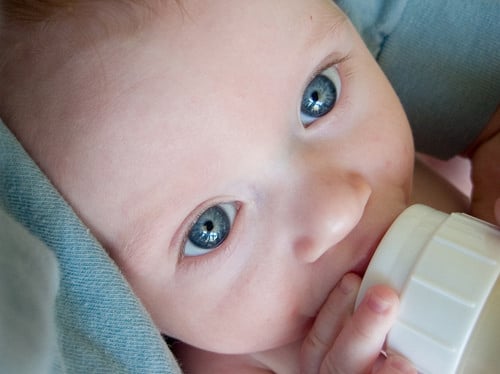
Baby bottle tooth decay is caused by prolonged exposure to sugar in drinks that come from the bottle including milk and juice. Most at risk are babies or toddlers who sleep with a bottle as the liquid tends to seep out and pool in the mouth.
But are these cavities really a problem? Don’t baby teeth just fall out anyway? Yes they do, but baby teeth serve an important purpose. Baby teeth hold the place for permanent teeth. Children need strong, healthy teeth to chew their food, speak and have a good-looking smile. Their primary teeth also help make sure their adult teeth come in correctly, which usually begins around 6 or 7 years of age. It’s important to start infants off with good oral care to help protect their teeth for decades to come.
As for breast-feeding infants and toddlers, breast milk does contain sugar, and can cause cavities, but nursing itself is less likely to cause decay because breast milk only flows when the baby is actively sucking, therefore it does not pool in the mouth as easily.
So How Do You Avoid Baby Bottle Tooth Decay?
-
Limit sugary drinks, such as juice, flavored juice drinks and soda. Refrain from putting sugary drinks in a bottle at bedtime! If your baby needs a bottle at night or nap time, fill it with water.
-
Practice proper oral hygiene from infancy. Start by wiping gums with a soft cloth until teeth come in, brush the new teeth as they appear, and supervise the child with brushing until age six or seven.
-
Don’t “share”. Parents sharing spoons or cups with the baby can introduce bacteria into the baby’s mouth.
-
Introduce a sippy-cup to your baby by the first birthday, and schedule your child’s first visit with the dentist as well.
Following the above suggestions can help reduce the risk that your little one may develop cavities or decay. At Wake Orthodontics and Pediatric Dentistry, we strive to develop good oral hygiene as early as possible so it becomes a lifestyle. If you would like to make your child’s first dental check-up, please call 919.719.1780 or request an appointment online.
